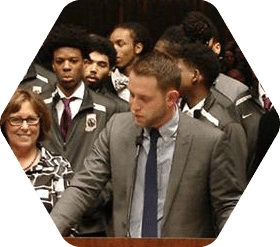Political purpose, process and policy
Political Science can be defined as the study of the way in which communities of people try to solve problems which are of mutual concern. Of primary interest to the political scientist are the theory, practice, origin and development of the state, government and other political institutions, both in this country and elsewhere in the world. Political scientists are concerned not only with governmental institutions at the national and international levels but also more broadly with political purpose, process and policy, both as they are and as they should be.
The political scientist, therefore, is interested in the distribution of power in society, the legitimacy and structure of government, the decision-making or policy-making process, the content of those decisions or policies, and how people and states attempt to resolve economic, social and political conflicts. Political science in the United States is generally conceived of as having four subfields:
With American government and law, the political scientist specializes in the politics of one country, the United States, studying executive, legislative and judicial institutions and relationships; interest groups, political parties and voting behavior of citizens; law and the administration of justice, and the policy-making process.
With comparative politics, the political scientist would specialize in comparing these political institutions, actors, laws, and policies across countries such as China, Russia, or Germany, or regions such as Europe, Africa or East Asia.
With international relations, the focus of study is on states and international organizations, which are the actors that form an interdependent yet largely anarchical society, and where diplomacy and law or violence and war determine the outcome of international disputes.
More International Relations & Global AffairsFinally, with political theory the political scientist focuses on theoretical questions such as what are the roles of political ideologies, what is the nature of political personality and political leadership, or how does gender relate to politics; as well as the perennial philosophical questions that go back to the ancient Greeks, such as what is the true purpose of the political community, what is the best form of political community, or what is the true nature of democracy, justice, or authority.
Purposes of the Political Science Program
- To help you become a fully engaged and aware citizen/resident and effective participant in whatever nation you ultimately call home. An educated person should be knowledgeable about politics and government at both the national and international levels.
- To introduce you to the four main subfields of political science: American politics and law, comparative politics, international relations, and political theory.
- To offer you an opportunity to specialize in one or more of these subfields.
- To help you prepare for a career in numerous fields relating to political science or for further study in graduate, law and other professional schools.







